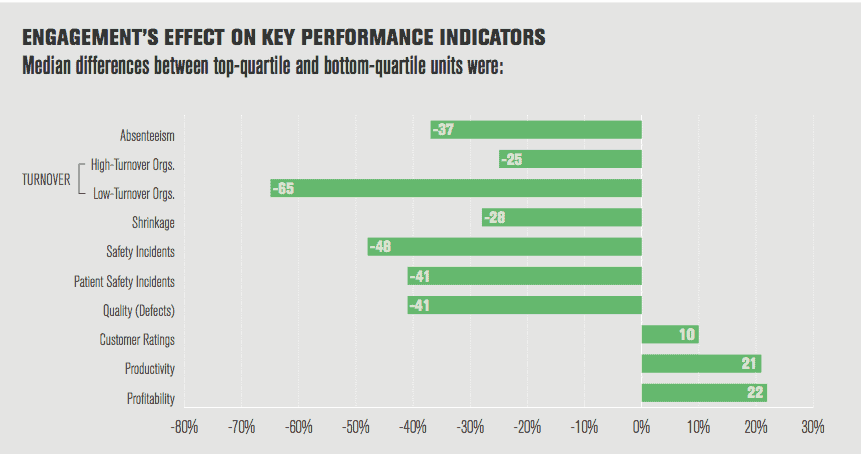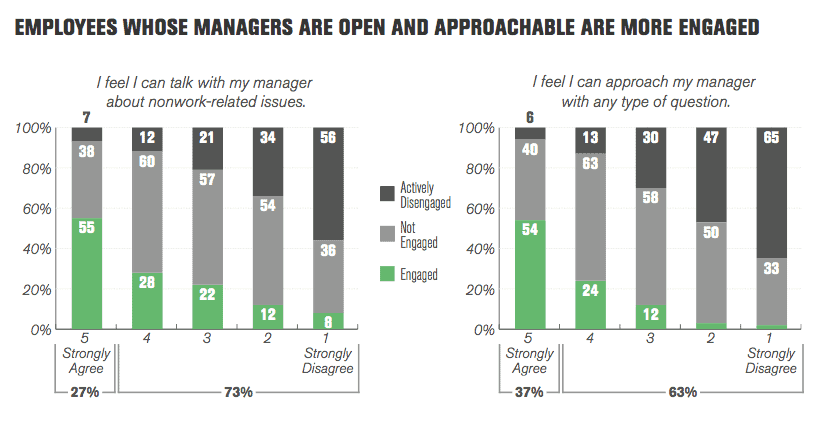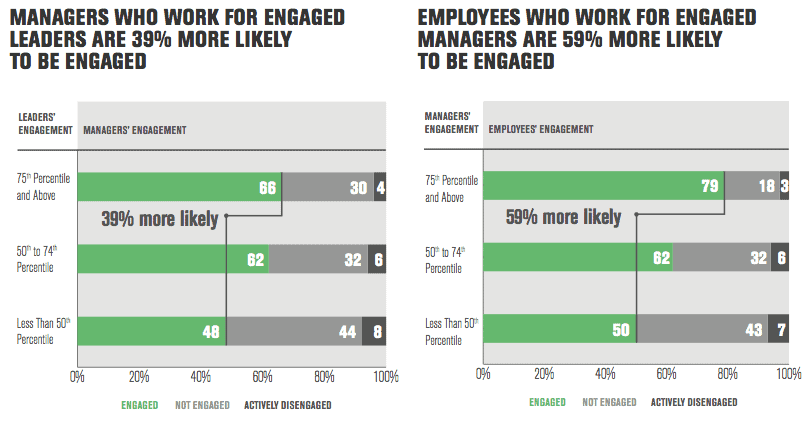In their "The State of the American Manager” study, Gallup found that half (50%) of all Americans have left a job to "get away from their manager at some point in their career.”
We've said it before, but it begs repeating: employees leave managers, not companies. And a bad manager can make employees leave the company.
A good manager can have a huge impact on not only the well-being, but the engagement and productivity of their team, as former Intel CEO Andy Grove pointed out in his classic, High Output Management:

Unfortunately, a bad manager can have exactly the opposite effect as Grove speaks to. A poor manager can crush engagement and motivation, tank productivity, and generally make coming to work a dread for their entire team.
In the same Gallup report, they found that "the manager accounts for at least 70% of the variance in employee engagement.” In the case of a bad manager, that lowered engagement then compounds into higher turnover among a variety of other problems:

What is a bad manager?
Becoming a manager is a career change just as much as deciding a profession you want to study in school. It requires learning new skills and taking on new responsibilities.
As much as you might like to think that every one of your managers has the best of intentions, they may not be a good fit for management at all.
The signs are often all around us when someone isn't a good fit to become a manager. Yet, it's easy for them to take the job anyways due to money, prestige, or simply inevitability because they've been around long enough.
Today we'll look at some of the most common warning signs that someone is likely to be a bad manager and the consequences of those signs being ignored.
Promote team members with caution!
Table of Contents:
- They do it for the money, not the actual job responsibilities
- They don't like dealing with people
- They don't want to give up individual contributor work
- They don't have a Growth Mindset
- They hate their job
- They don't listen
- How can companies avoid promoting bad managers?
- Signs someone would make a good manager
- The Differing Characteristics of a Bad Manager and a Good Manager
6 Signs of a Bad Manager
If you're wondering “Should I become a manager?” or thinking about if you're promoting the right people, these 6 signs are ones to look out for. If you are looking at becoming a senior manager and these resonate, or they do for the person you're considering promoting, then they probably shouldn't be a manager.
1) They do it for the money, not the actual job responsibilities
At many companies, the only way to keep getting raises and "advance" through your career is to move into management. This puts pressure on people to consider management even if they're not excited about the prospects of becoming a manager.
While money is fair to be part of anyone's work motivation, it's a big warning sign you might be making a bad manager choice if their top motivation is this. No amount of money will make you enjoy doing tasks you don't actually like.
The consequence: If someone took the job for the money, they're likely to hide from problems that could lead to them being removed. They're also unlikely to admit there are issues and ask for help as they worry that would cost them a much coveted financial boost.
2) They don't like dealing with people
Not everyone wants to spend their days helping fix people's issues, listening to the problems of others, and developing people. If they're not excited to do those things, they probably shouldn't be a manager.
This one is particularly damaging to team members. Gallup's recent study found that managers who don't take an active interest in their people have teams that are almost entirely not engaged, and the majority are even actively disengaged and checked out:
The consequence: Without rapport, there's no trust, empathy, or candor in your relationship with their team. Problems will fester and grow until they blow up because the team won't come to them when they're easy to fix. This leads to the manager constantly in reactive management mode and frustrating their team.
3) They don't want to give up individual contributor work
Particularly for engineers and others in creative roles, it can be hard to give up doing individual work. It's easy to want to take the new manager title and keep doing lots of the "fun" individual contributor tasks.
Unfortunately, that's an easy way to short change all their managerial responsibilities. And since managers set priorities and delegate tasks, it's easy to assign all the best work to themselves. This can create both a lot of management debt, and resentment from getting bad assignments from their manager.
The consequence: If they try to do all the work themselves, their team won't get the help they need. The team may also resent their manager if they constantly take the "good work" and leave them with less desirable tasks. There's a reason the saying goes, "Leaders eat last."
4) They have a Fixed Mindset instead of a Growth Mindset
The Growth Mindset is the idea that any skill can be learned. No one is simply “a natural” and others are doomed to never be good at it. It takes hard work, but with effort, anyone can learn and improve at a skill.
Your best employees will have a growth mindset, learning new skills often. Promoting anyone with the opposite mindset (a Fixed Mindset) is a tremendous risk. Their attitudes not only then impact them, but their teams.
The consequence: First and foremost, a manager with a Fixed Mindset will personally suffer, because there is too much to learn as a manager to not embrace your own need to learn new things.
Even worse, this Fixed Mindset will then multiply across their team as their team members won't grow, they may get bored with their job, get frustrated about being boxed into doing the same things all the time, and ultimately leave for growth opportunities beyond your company.
5) They hate their job
If someone is clearly unhappy at work, then promoting them to manager is just going to create a bad manager. They're likely to still be an unhappy, grouchy, unmotivated employee who now spreads that attitude to their team.
The effect of this has been captured by Gallup in more of their research in something they call the "Cascade Effect," which shows that disengaged managers have teams more likely to also not be engaged:
The consequence: On top of hurting everyone on their team by setting an example of disdain for work, it hurts your growth; how can a bad manager hire effectively if they can't sell why working here is great? And what happens to the rest of the team if they have a toxic leader running every meeting, bringing storm clouds and negativity every day?

6) They don't listen
How many times have you come out of a meeting with the feeling your ideas and input weren’t really heard?
A recent study by Psychological Associates found that 1 in every 4 managers falls into the “bad listener” category. They found that only 12% of managers know to check if their employees are ready to move on from a certain point on their meeting agenda – instead, the majority tend to plow right through the scheduled topics of conversation.
The consequence: An employee who tends to dominate conversations, doesn’t ask questions of others, and seems to “like the sound of their own voice” a little too much is very likely to become a terrible manager.
Good managers understand the importance of getting buy in (and all the listening that is needed to do so). Bad managers will instead alienate their team and find it harder to be productive and effective as they push their own agenda in isolation.

Want to avoid the risk of being known as the bad manager?
You can start becoming a better manager in just 15 minutes per week by taking one of our courses like Krzysztof and his team have. Learn all the ways they invest in learning good management skills here:
How can companies avoid promoting bad managers?
The team of a bad manager suffers most in all of these cases. A single terrible manager can hurt your employee retention of not just the manager, but everyone that reports to them potentially costing you hundreds of thousands of dollars or more to replace everyone.
This is a decision to not take likely, so how can you avoid creating bad managers in your organization?

1) Create a growth path for individual contributors
If the only way for employees to advance in their career at your company and get pay raises is to become a manager, you will continue to attract people to the roles that shouldn't take them.
You have to create a path for individual contributors if you want to eliminate this problem. As Rand Fishkin, CEO of SEOMoz writes:
"I worry that some significant portion of that expressed desire doesn't come from a true passion for the responsibilities of people managing, but instead exists because they want to level up their career and/or influence and believe this to be the only path."
When people see that their deep and growing individual contributor experience is valued and can be leveraged even more as they advance, you will find that they will no longer consider people management roles.

2) Promote based on a level of aptitude and interest in people skills
This may seem like an obvious one, but it's amazing how many companies will simply make someone a manager because they like them, or they're a great individual contributor.
The skills required to succeed are different and even the best person can be set up for failure without help.
Start developing your employees to be managers *before* you need to promote them. Simple things like empathy and people skills are easy to learn by first leading small projects, managing an intern, and reading great books like How to Win Friends and Influence People.

3) Make it safe for a manager to decide it's not for them
People may think they want to be a manager, but once they start doing the job they find they're unhappy. Unfortunately, it's hard to admit that, especially if doing so means a demotion and/or pay cut.
Sadly, managers in this situation feel embarrassed and unsupported, so to save face, they often leave for an individual contributor role at another company.
Returning to an IC role is good for everyone.
If instead there's a graceful way for a poor manager to transition to a different role that's a better fit, you spare their team as much as you help them. Otherwise, either the team all leaves/transfers or the manager quits (or in particularly bad situations, both happen).
Dale Carnegie has a great story about how GE kept a brilliant engineer who had failed as a manager:
"Steinmetz, a genius of the first magnitude when it came to electricity, was a failure as the head of the calculating department. Yet the company didn't dare offend the man. He was indispensable - and highly sensitive.
So they gave him a new title. They made him Consulting Engineer of the General Electric Company - a new title for work he was already doing - and let someone else head up the department.
Steinmetz was happy."
By letting Steinmetz save face and move into a great IC role, they spared the team who didn't like reporting to him, and gave him a graceful way to stay at the company. This is the type of pro-leadership move that costs you almost nothing, and helps you have the best team possible.
--
Knowing what to avoid is the first step. Now, let's talk about what to look for, so you can fill your team and company with good managers.

3 Signs someone would make a good manager
We've covered some main signs someone is, or would make, a bad manager. We also covered ways to protect yourself from promoting bad managers.
Beyond that, what are some signs you can look for that would help you identify employees who are a good fit for management? How do you know if someone would make a good leader?
Knowing the things you don't want in a future manager is important, but if all you're doing is avoiding those you're not doing everything you can to promote the right people.
These are three signs on the opposite spectrum; here are signs someone would make a good manager:

1) They show empathy for their teammates
Great leaders are servants. That's the first, and possibly most important, thing a new manager can learn.
Whereas you might have been used to focusing on IC work up until now, as a manager, you need to shift your thinking from individual contribution to how you can multiply the productivity of your team.
In other words, it's all about how you can make them better, as well as support them.
The ability to care about your teammates is a hallmark of a good leader. If someone is consistently showing through their actions that they're thinking about their teammates and helping others grow and improve, that's the sign of someone who would make a great servant leader.
Sympathy vs. empathy: The mark of a good leader
This post from Inc. explains well the difference between the average person who has sympathy vs. a potential leader who shows empathy:
"According to Merriam-Webster, empathy is 'the feeling that you understand and share another person's feelings and emotions.'
Whereas sympathy involves feeling sorry for someone, empathy requires us to go a step further, and it lasts longer. Here's an example:
Imagine a colleague goes through a difficult situation; let's say he loses a close family member in an accident. We naturally feel sympathy for him. We may even write a card or express those feelings somehow. For the most part, though, we move on with our lives.
But when we show empathy, we take more time–time to remember how we felt when we lost someone close to us (or how we would feel, if we haven't had this experience). We think about how this affected our work, our relationships with others.
Even further, we try to imagine specifically how our colleague feels in this situation. We recognize that he (like every individual) will deal with the trauma in his own unique way.”
It's important for leaders to go that extra distance to understand what's going on in their team member's minds. The better they understand what they're going through (good or bad), the better they can support them in the best ways possible.
This approach matters because when people feel supported, understood, and psychologically safe, they perform better in their jobs.
To learn more about the importance of leading with empathy and the power of putting others first as a way of building rapport and trust, there's no better book than Dale Carnegie's classic, How to Win Friends and Influence People.

2) They're a good listener
Ever met someone who wouldn't stop talking about themselves? You spoke "together” for thirty minutes, but they never once asked you a single question?
A good leader is the opposite of this: they understand that listening is a critical part of leading effectively. Without effective listening, you can't know what's wrong, you may misread situations, and you lack the understanding of your team.
Good listeners ask good questions.
A key part of this is the ability to ask effective questions. As a leader, you need to be endlessly curious about your team.
With the right question at the right moment, you can discover the heart of an issue, encourage a team member to open up and build rapport, or obtain valuable feedback you can use to improve the team or yourself.
Questions are the lens that magnifies the power of listening. You could let a conversation go wherever it happens to go, or you could ask the right follow-up question to really understand a situation fully.
However, asking the right questions and being willing to listen aren't the only things that go into making someone a good listener. You have to follow through.
Talk without action is pointless and frustrating. To avoid this, practice active listening, by repeating back what you think you heard, and making sure they agree with what you say.
Then, it's about taking notes, and taking action, to follow through on what you heard, so that the person knows it's worth the effort to talk to you. It's easy to forget to do this, but it makes all the difference in how people feel about talking with you in a manager - team member relationship.
If you see a team member is good about asking questions as much as sharing opinions and is careful to take notes and keep their promises, then they have strong signs they could be a good listener and manager.
To learn more about the power of questions and curiosity as a tool for improvement, read Brian Grazer's fascinating book, A Curious Mind.
And you can read more about the power of curiosity and asking questions as a manager in our post here: The most important, yet overlooked management skill.

3) They're interested in being a leader (not a boss)
This last one might sound obvious, but so much of what makes someone a good candidate for leadership is their desire to be a manager in the first place (or not).
Wanting to be a manager is about interest in the actual job and day-to-day tasks, not the title.
If you're interested in the life of a leader (and you fully understand what that means), the likelihood is you're:
- Willing to give up IC work to work to make your team better through a multiplier mindset
- Prepared to make effective communication and listening a priority
- Bringing a growth mindset and a desire to learn all the new skills needed to succeed as a leader
Wanting to do the work of a leader is a special calling, and not everyone will want to do those things. It's why we outlined all the right and wrong reasons to be a manager today, so it's easier to answer the question, "Should I be a manager?"
Unfortunately, it's easy to think a manager is "the boss", but that won't get you far. Instead, being a good manager is about working to serve your team and your mission. That takes a different kind of makeup of a person.
For managers, desire > talent
From what I've seen, nothing is more important for a leader than wanting to be a manager for the right reasons. No one goes to school to be a manager, so everyone has to learn a lot to succeed. Those with the right mindset are more enthusiastic and dedicated to learning the skills they need and filling in the gaps they have.
Ironically, some people you'd call a "natural leader" will struggle most; they may want the responsibility, but then coast on their charisma and natural abilities. Meanwhile, the less natural manager, who has a growth mindset will zoom past them as they work hard to learn and master the myriad of skills needed to be a great leader.
To help you or a future manager better understand what the life of a true leader looks like, one of the best books ever written on the subject is John C. Maxwell's 21 Irrefutable Laws of Leadership, which paints a clear picture between the self-serving boss and a true servant leader.
To learn more about what qualities to look for in a good manager, read our post: Who do you promote? 5 Qualities of a Good Leader.
The Differing Characteristics of a Bad Manager and a Good Manager
We have a handy table for you that summarizes the key differences between good and bad managers:
| Characteristic | Good Manager | Bad Manager |
|---|---|---|
| Motivation | Focused on team growth and success | Motivated primarily by money or personal gain |
| Approach to People | Empathetic, supportive, and collaborative | Focused on how their team can benefit them |
| Handling Individual Work | Prioritizes delegation and development of team | Unwilling to give up individual work and often territorial |
| Mindset | Possesses a growth mindset, always seeks to learn and improve | Stuck in a fixed mindset, resists change |
| Job Satisfaction | Enjoys the role, spreads positivity | Unhappy, spreads negativity and frustration |
| Listening Skills | Actively listens, values input, seeks understanding and feedback | Poor listener, fails to engage with nor listen to team members |
Know what you're looking for when choosing your managers
Few employees know what it's like to be a manager before they get placed in the driver's seat.
It's not their fault. Rarely is it made clear to them what leadership is really like. Just like you have a small glimpse of their day-to-day work, they only see small pieces of what you do.
It's no wonder then, companies often make the mistake of promoting the wrong people, creating bad managers.
To avoid those problems, remember to:
- Make sure you have systems in place that ensure you promote the right people for the right reasons.
- Work on developing quality senior leaders — don't presume they are easily found.
- Allow new managers to decide leadership isn't for them if they change their minds.
- Support new managers so they learn and grow into the role more easily.
Remember, employees leave managers, not companies. Being able to identify the right people for management and giving them the tools to succeed affects everything at your company from engagement to turnover. A little thought now can save you a lot of headaches and problems in the future.
Become the manager you always wanted with Lighthouse Lessons.
Our bite size, highly actionable programs are purpose-built to make it easy for you to build the skills you need to succeed. Build the skills you need to be a great leader like Laura Knight did by learning more and signing up here.










